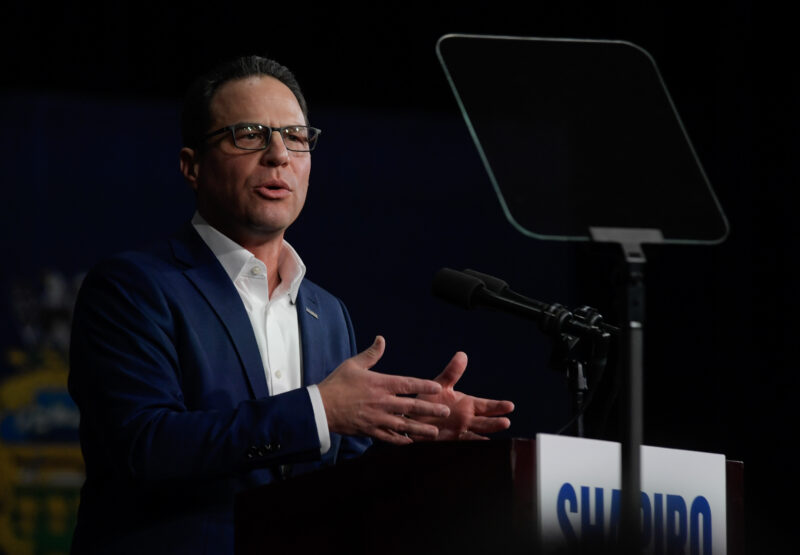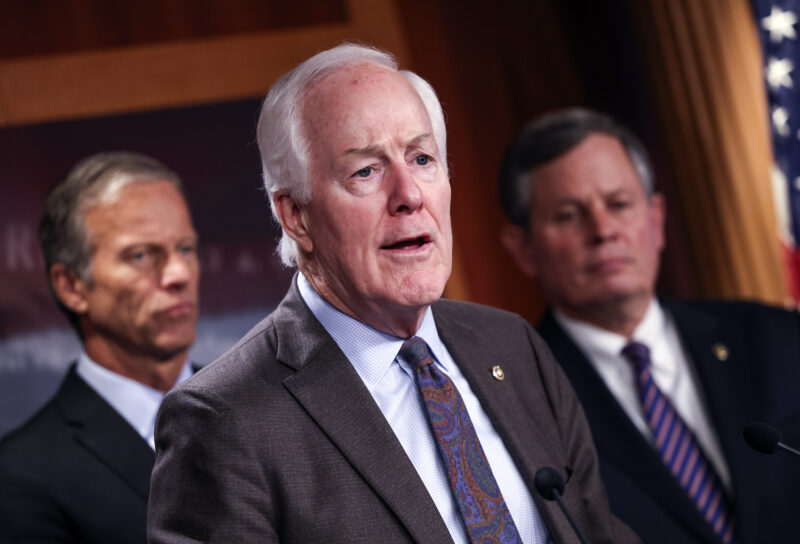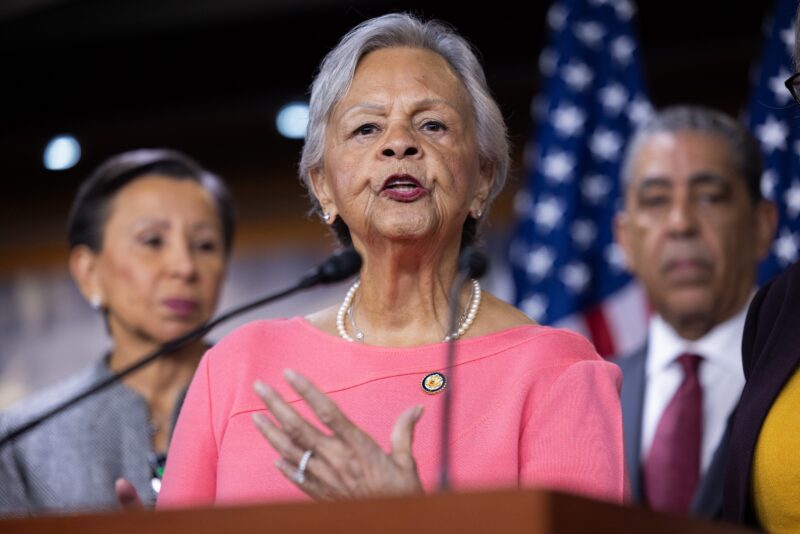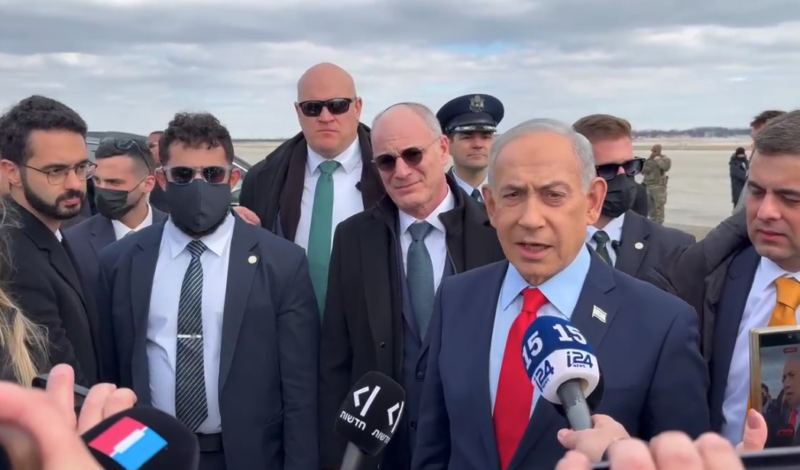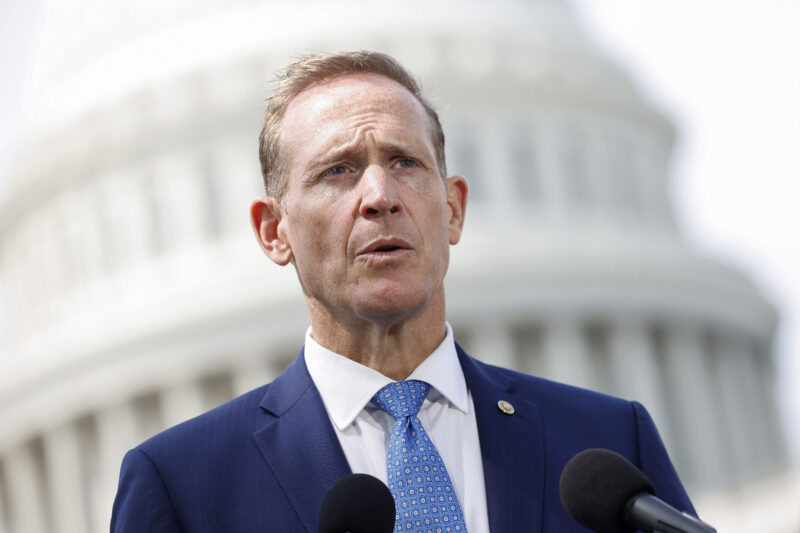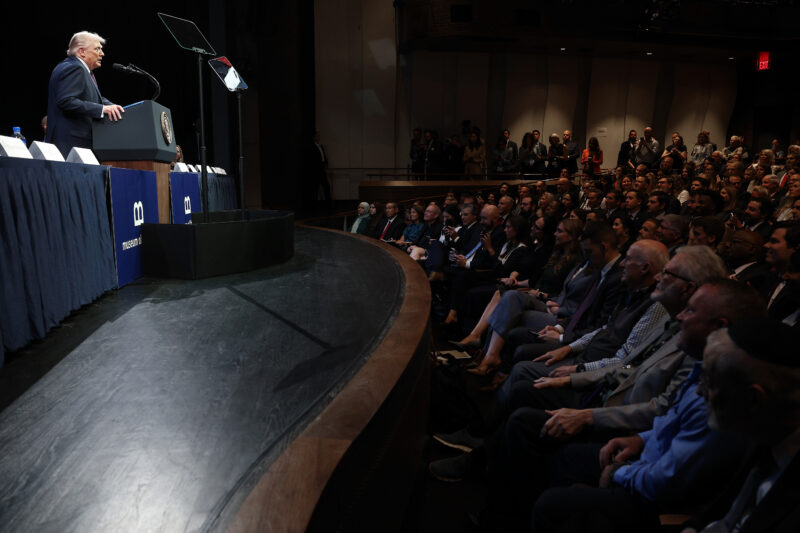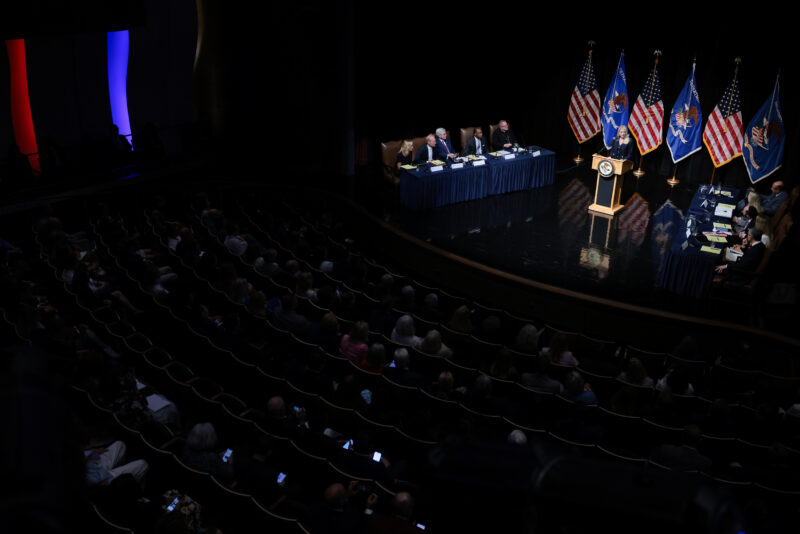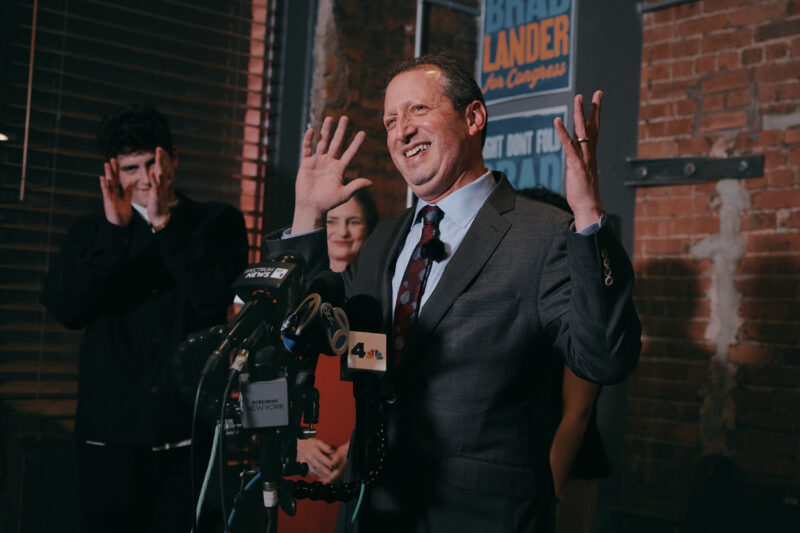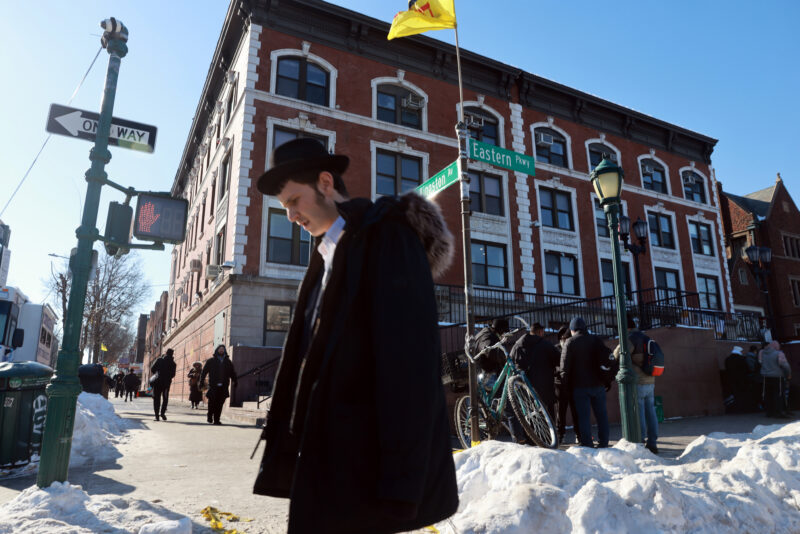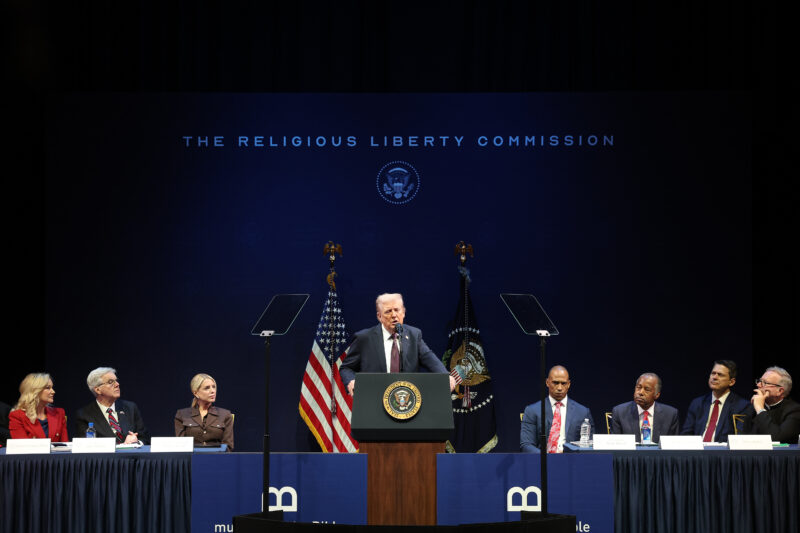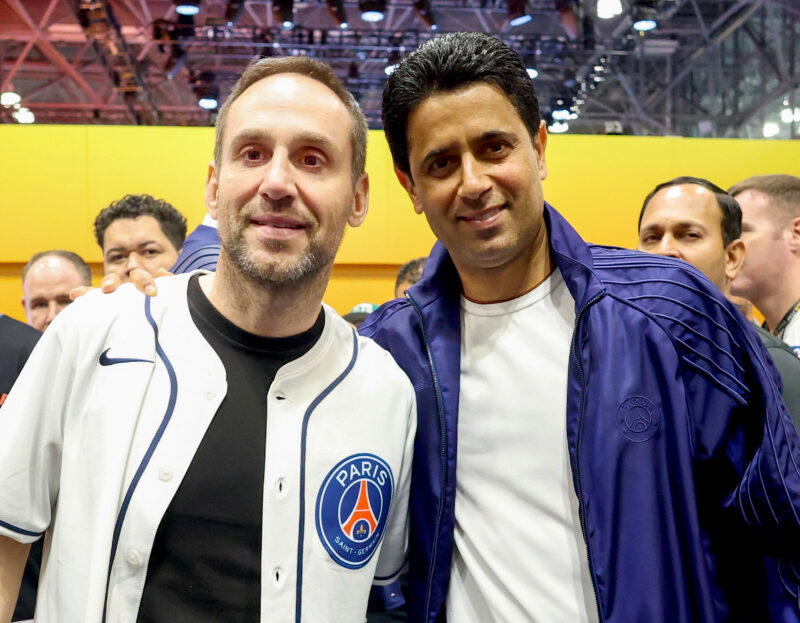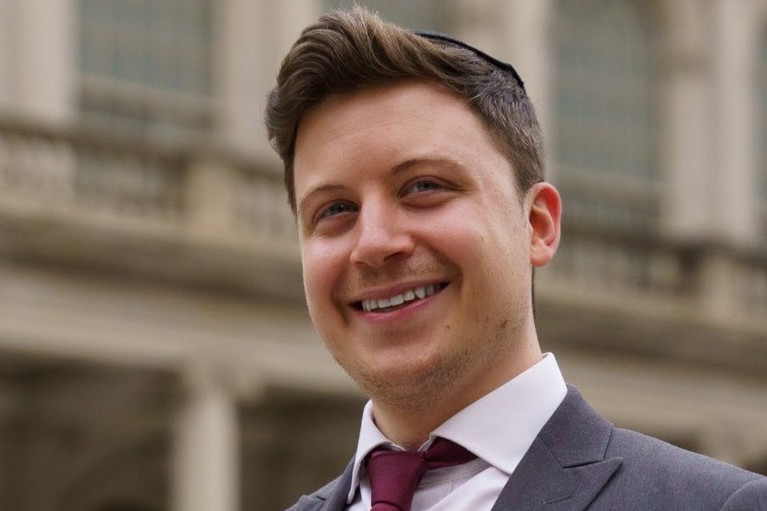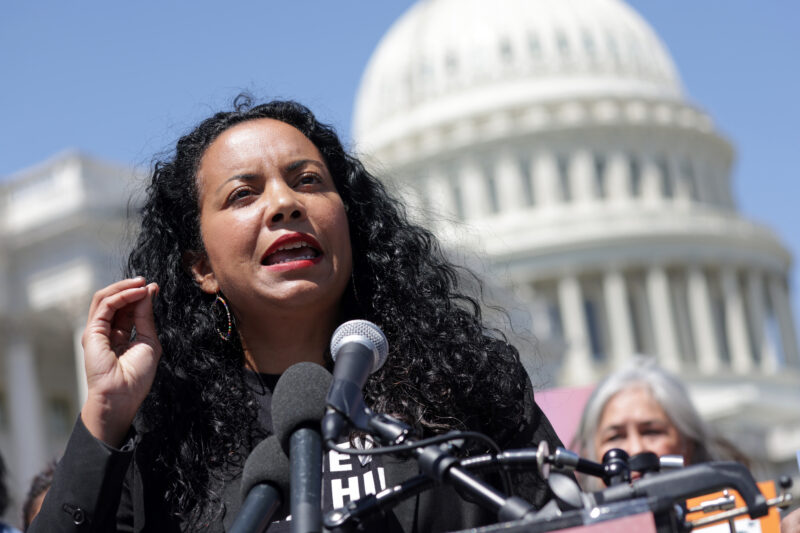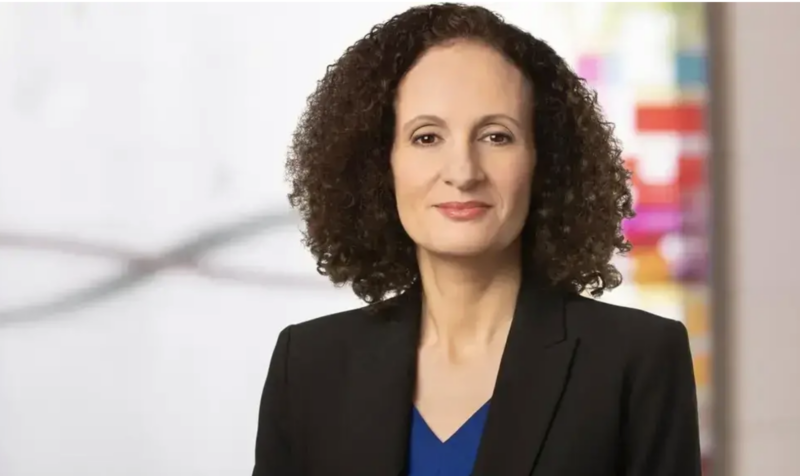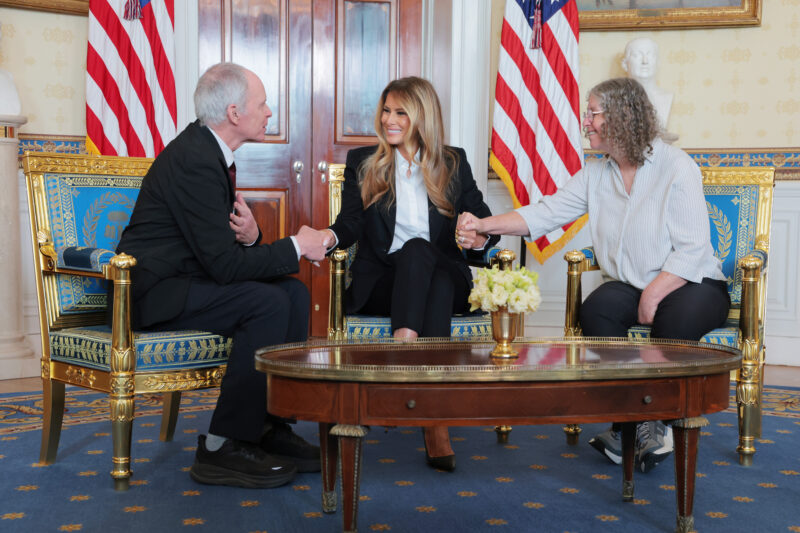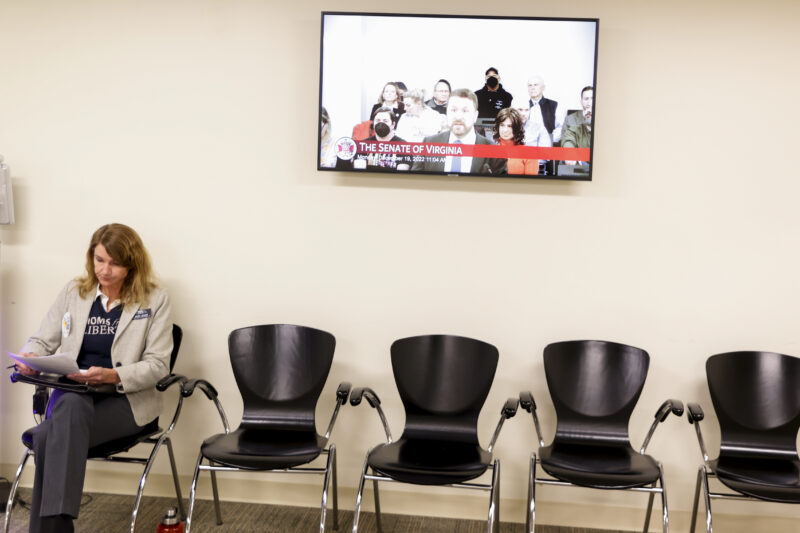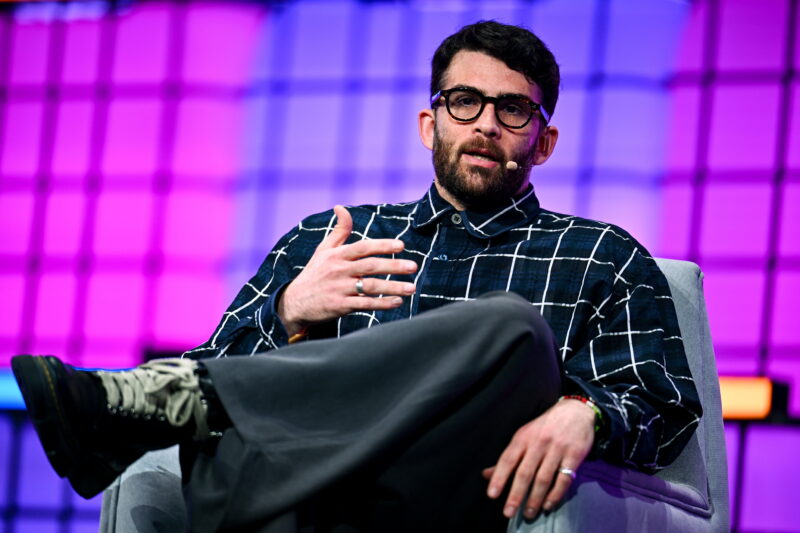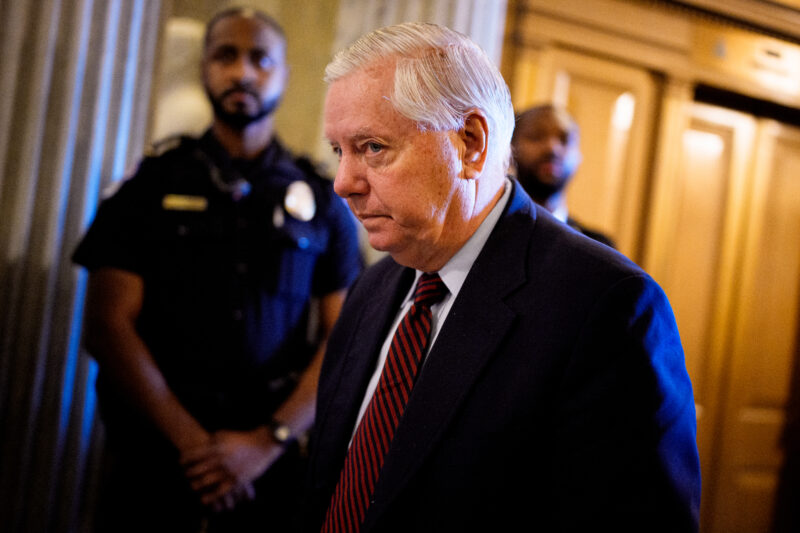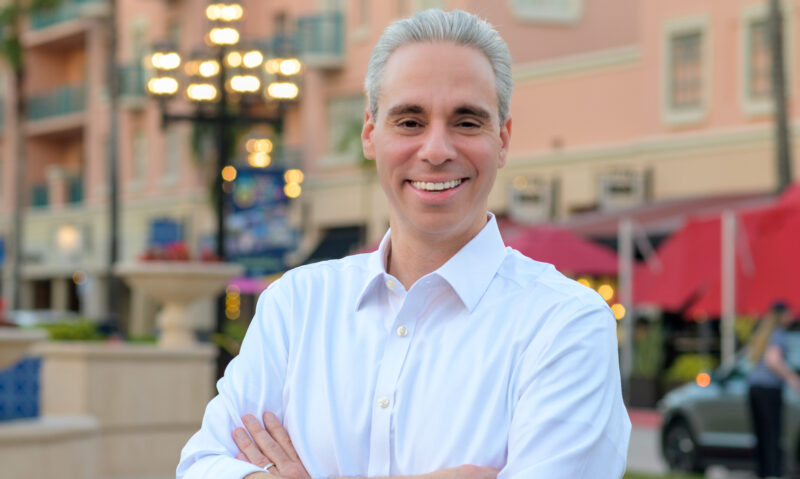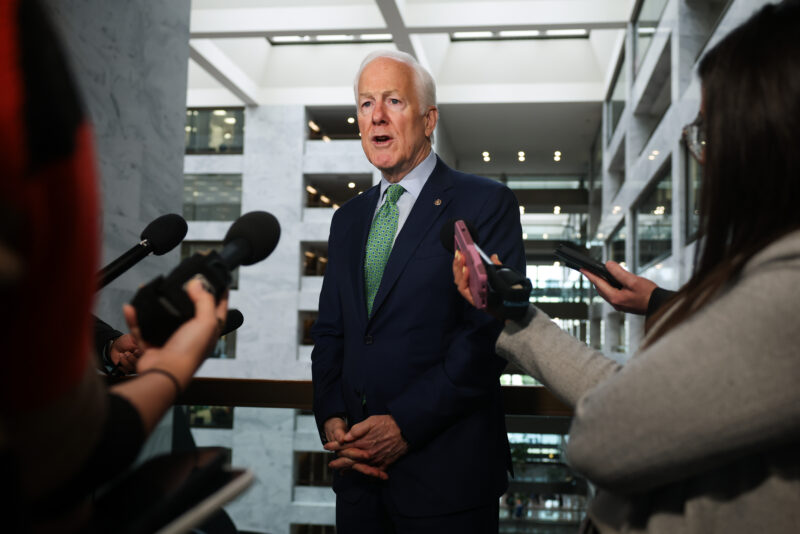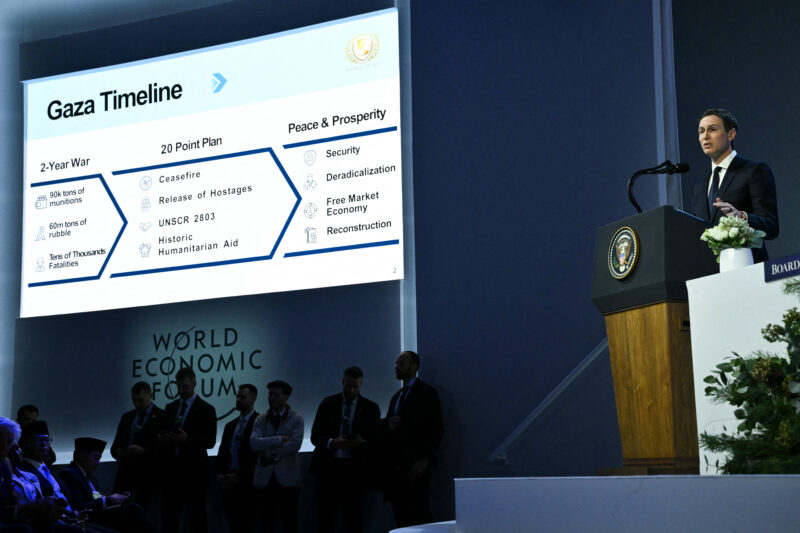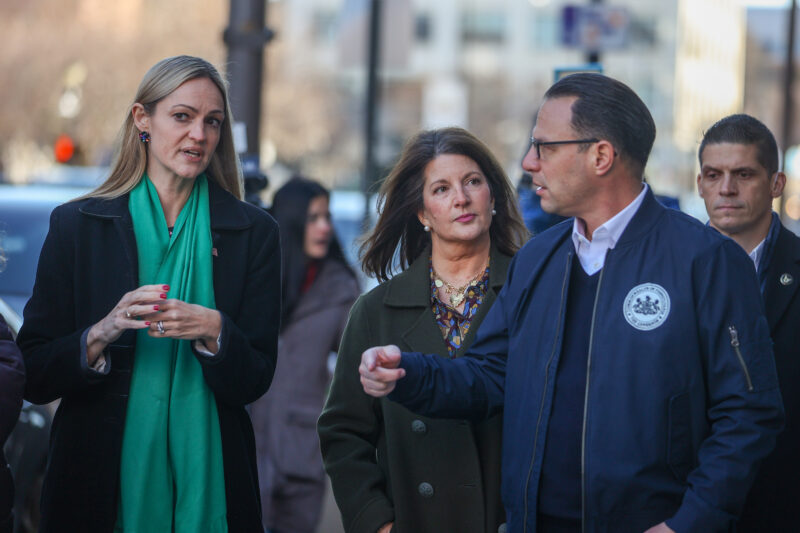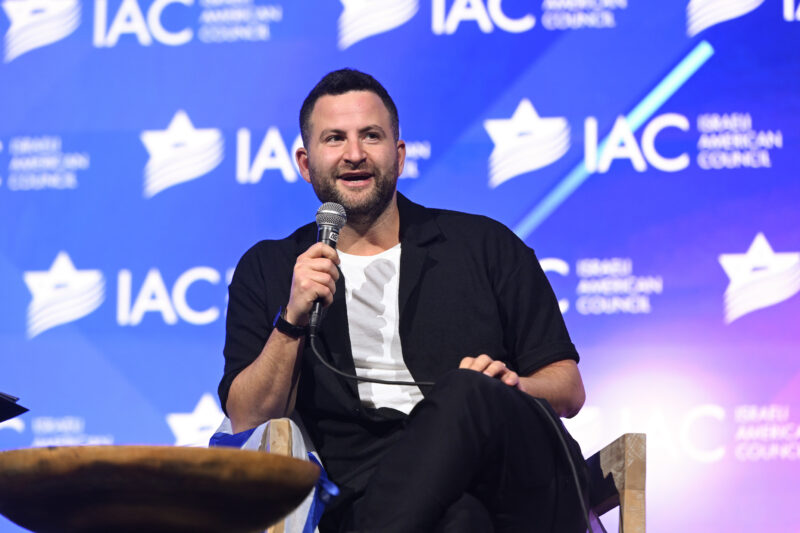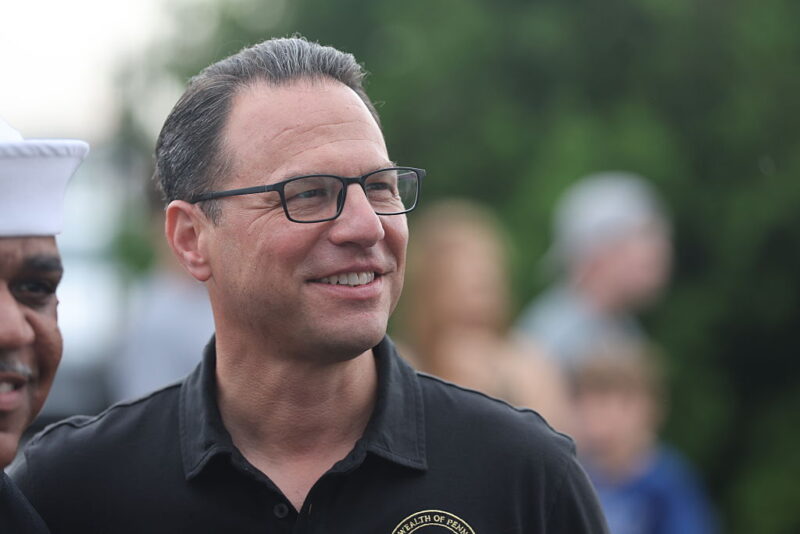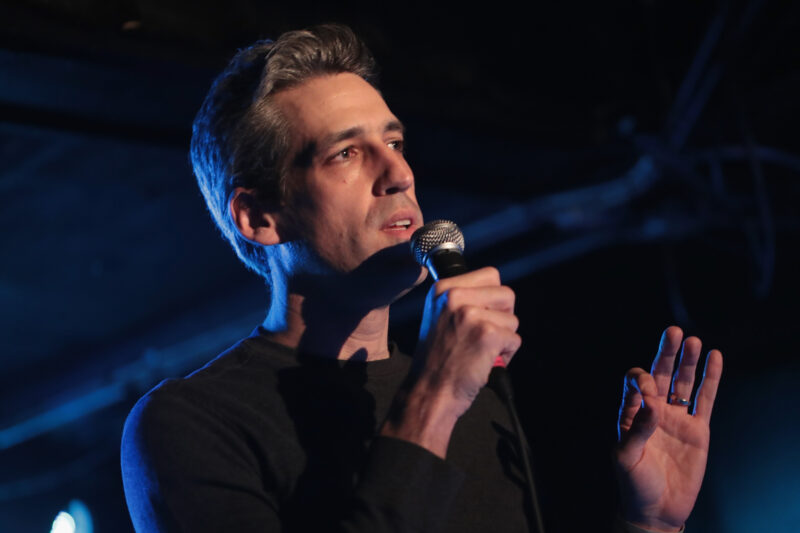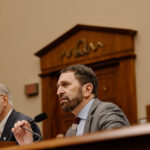Carlson: ‘I can just sort of picture the scene in a lamp-lit room with a bunch of guys sitting around eating hummus, thinking about, ‘What do we do about this guy telling the truth about us?’

Joe Raedle/Getty Images
Tucker Carlson speaks during the memorial service for political activist Charlie Kirk at State Farm Stadium on September 21, 2025 in Glendale, Arizona.
Right-wing political commentator Tucker Carlson, who has hosted Holocaust deniers and antisemitic influencers on his podcast, used his address at the memorial for conservative influencer Charlie Kirk in Arizona on Sunday to compare Kirk’s assassination to the killing of Jesus.
The former Fox News host began his remarks to the more than 70,000 people in attendance at State Farm Stadium in Glendale by noting that the political engagement brought on by Kirk’s killing “actually reminds me of my favorite story ever,” before offering an account of how Jesus was killed in Jerusalem. While he never brought up the Jewish people by name, he made references to Jewish culture to suggest that he was referring to the antisemitic trope that Jews were responsible for the killing of Jesus.
“It’s about 2,000 years ago in Jerusalem and Jesus shows up, and he starts talking about the people in power, and he starts doing the worst thing that you can do: just telling the truth about people, and they hate it, and they just go bonkers. They hate it, and they become obsessed with making him stop. ‘This guy’s got to stop talking. We’ve got to shut this guy up,’” Carlson said.
“I can just sort of picture the scene in a lamp-lit room with a bunch of guys sitting around eating hummus, thinking about, ‘What do we do about this guy telling the truth about us? We must make him stop talking.’ There’s always one guy with the bright idea, and I can just hear him say, ‘I’ve got an idea. Let me just kill him. That’ll shut him up, that’ll fix the problem.’ It doesn’t work that way,” he continued.
Carlson, who spoke for just under six minutes, then quoted the beatitude from Matthew 5:4: “Blessed are those who mourn, for they will be comforted.” He connected the passage to Kirk’s political message, making the argument that the slain conservative activist “was bringing the gospel to the country. He was doing the thing that the people in charge hate most, which is calling for them to repent.”
“How is Charlie’s message different? Charlie was a political person who was deeply interested in coalition building and getting the right people in office, because he knew that vast improvements are possible politically, but he also knew that politics is not the final answer. It can’t answer the deepest questions, actually, that the only real solution is Jesus,” Carlson said. “Politics at its core is a process of critiquing other people and getting them to change. Christianity, the gospel message, the message of Jesus, begins with repentance.”
Carlson went on to praise Kirk for not having “hate in his heart” and being able to “forgive other people” by following “a call to change our hearts from Jesus,” before acknowledging his own shortcomings.
“Charlie was fearless at all times, truly fearless. To his last moment, he was unafraid. He was not defensive, and there was no hate in his heart. I know that because I’ve got a little hate compartment in my heart, and I would often express that surely about various people,” Carlson said. “He would always say, ‘That’s a sad person, that’s a broken person, that’s a person who needs help, that’s a person who needs Jesus’. He said that in private, because he meant it.”
Analyzing similar digital footprints of two teen shooters, the organization plans to warn schools of risk

Getty Images
Man using smartphone in sofa.
In December 2024, Natalie “Samantha” Rupnow opened fire at Abundant Life Christian School in Madison, Wisc., killing two and injuring six before taking her own life. A month later, Solomon Henderson shot and killed one person and wounded another at Antioch High School in Nashville, Tenn., before also killing himself.
What ties the two heinous acts together, a new report from the Anti-Defamation League’s Center on Extremism suggests, is an online community of white supremacists increasingly recruiting and inspiring school shooters like Rupnow and Henderson.
The research, published Thursday as an interactive timeline, analyzes the two school shootings that occurred weeks apart. Despite happening in different states, the report found overlapping online activity between the young perpetrators.
In the months leading up to the shootings, both perpetrators were active on the website WatchPeopleDie, a forum where users can post and view real images and videos of violence — including murders, torture, rape, executions, beheadings, suicides, dismemberments, accidents and animal killings.
Rupnow and Henderson carried out their attacks 18 and 19 months after creating WPD accounts, respectively. Both shooters posted, reposted, endorsed, replied to or otherwise engaged with extremist content on the site.
ADL researchers found that extremist material — such as white supremacist and antisemitic manifestos and videos of white supremacist and antisemitic mass murders — was widely accessible on WPD, which originated as a forum on Reddit but is now independent after being banned from the site in 2019 after a user livestreamed the white supremacist Christchurch shooting in New Zealand.
Many videos of extremist mass killings, including those that were livestreamed as they occurred, remain accessible on the site, including the 2022 Buffalo Tops supermarket attack and the 2019 Halle synagogue shooting in Germany.
Clips from attacks and images of shooters using stylized filters and text, set to music that glorifies the killers, are also popular on the site. Henderson posted one such graphic depicting Payton Gendron, the gunman who killed 10 Black people in the Buffalo supermarket shooting, as a saint holding his manifesto in place of a Bible.
The ADL said it plans to share the timeline with 16,000 school superintendents, urging them to “consider how their students may be able to access the type of dangerous content highlighted in the timeline while on their campuses and in their classrooms.”
“Kids and teens today have lived their entire lives with easy internet access, putting them even more at risk of encountering violent extremism online,” Jonathan Greenblatt, the group’s CEO, said in a statement. “Extremist ideas combined with gore websites can inspire users to seek out more extremist content, while violence on extremist platforms can inspire others to look for even more violent content. It’s a vicious cycle, especially for young people. We hope this research guides all stakeholders in taking action to prevent future attacks.”
LePatner, a Blackstone executive, served on the boards of the Abraham Joshua Heschel School and UJA-Federation of New York
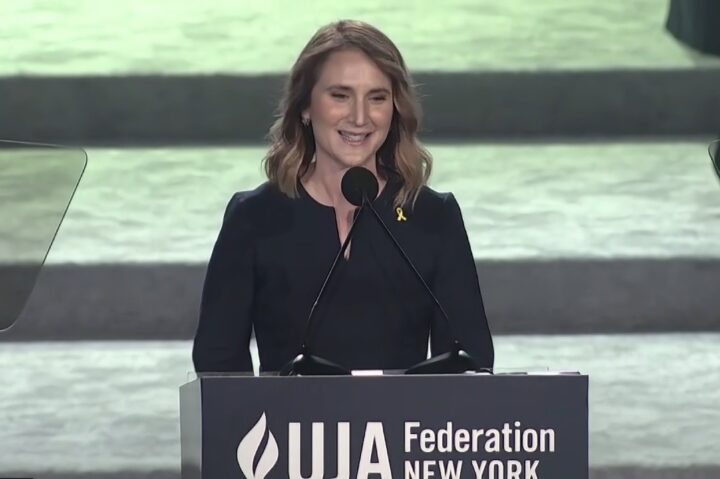
courtesy/UJA-Federation of NY
Wesley LePatner speaks at the UJA-Federation of New York's annual Wall Street Dinner in December 2023.
Wesley LePatner, a Blackstone executive who was involved with Jewish communal organizations in New York City, was killed in the Monday shooting at the firm’s Midtown headquarters, the company confirmed on Tuesday.
LePatner was the global head of Core+ Real Estate at Blackstone and CEO of Blackstone Real Estate Income Trust, according to Blackstone’s website. A Yale graduate, she joined the company in 2014 after more than a decade at Goldman Sachs.
She served on the board of trustees at the Abraham Joshua Heschel School, a pluralistic Jewish day school in New York, and she joined the board of directors at UJA-Federation of New York earlier this month.
“We are devastated by the tragic loss of Wesley LePatner, a beloved member of UJA’s community and a member of our board of directors, who was killed in yesterday’s mass shooting in Midtown,” the federation said in a statement.
“Wesley was extraordinary in every way — personally, professionally, and philanthropically,” the organization said. “In the wake of Oct. 7, Wesley led a solidarity mission with UJA to Israel, demonstrating her enduring commitment in Israel’s moment of heartache. She lived with courage and conviction, instilling in her two children a deep love for Judaism and the Jewish people.”
In 2023, LePatner was awarded the Alan C. Greenberg Young Leadership Award at UJA’s 2023 annual Wall Street dinner. In a speech, she outlined her involvement with the organization, dating back nearly two decades.
“I first attended the UJA Wall Street dinner as a young analyst in 2004, where I am pretty certain I sat in one of the last tables at the back of the room,” LePatner said at the event, which took place two months after the Oct. 7 attacks. “Never in my wildest imagination could I have believed that I would be up on this stage two decades later. UJA has many super-powers, but its most important in my view is its power to create a sense of community and belonging, and that ability to create a sense of community and belonging matters now more than ever.”
LePatner also sat on the board of the Metropolitan Museum of Art, the Yale University Library Council and Nareit, a real estate organization.
The shooting also claimed a second Jewish victim, Julia Hyman. A Cornell graduate, Hyman worked for Rudin Management in the Midtown skyscraper.
Ofir Akunis, consul general of Israel in New York, called the murder of LePatner and Hyman — as well as NYPD Officer Didarul Islam — “horrific and senseless” at the Israel on Campus Coalition’s National Leadership Summit in Washington on Tuesday. “In this difficult moment, Israel stands in solidarity with New Yorkers and all Americans,” Akunis said.
The union’s board of directors said the proposal ‘would not further NEA’s commitment to academic freedom’
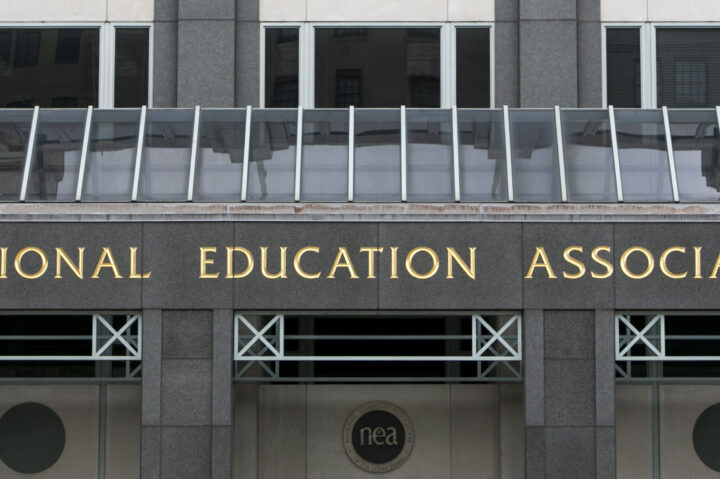
Kristoffer Tripplaar/Sipa via AP Images
A logo sign outside of the headquarters of the National Education Association (NEA) labor union in Washington, D.C. on July 11, 2015.
The National Education Association, the largest teachers’ union in the country, announced on Friday that it would not cut ties with the Anti-Defamation League, declining to implement a contentious resolution approved by its governing body earlier this month that sought to target the Jewish civil rights organization.
“After consideration, it was determined that this proposal would not further NEA’s commitment to academic freedom, our membership or our goals,” the union’s board of directors said in a statement.
The decision came nearly two weeks after the measure was adopted by the NEA’s representative assembly, its annual leadership gathering that drew more than 6,000 union delegates.
“There is no doubt that antisemitism is on the rise. Without equivocation, NEA stands strongly against antisemitism. We always have and we always will,” the NEA’s board wrote. “In this time of division, fighting antisemitism, anti-Arab racism, and other forms of discrimination will take more resources, not fewer. We are ready.”
ADL CEO Jonathan Greenblatt cheered the union’s decision to distance itself from the “misguided” measure.
“We are committed to working with the NEA and all teachers’ unions to join the Jewish community in making clear these hateful campaigns cannot succeed. They must redouble efforts to ensure that Jewish educators are not isolated and subjected to antisemitism in their unions and that students are not subjected to it in the classroom,” Greenblatt said in a statement.
The measure faced fierce backlash from the Jewish world. A letter authored by the ADL expressing opposition to the proposal — which would have discouraged educators from using teaching materials from the ADL — garnered the support of roughly 400 Jewish organizations across the country, including the leadership of the Reform, Conservative and Orthodox movements.
Other outside Jewish groups, including the Conference of Presidents of Major American Jewish Organizations, the American Jewish Committee and Jewish Federations of North America, released a statement welcoming the NEA’s rejection of the anti-ADL resolution.
In one incident, a professor accused a student of having a Jewish ‘mind infection’ and harassed another on social media

Scott Eisen/Getty Images
Commencement preparations in front of the Great Dome at Massachusetts Institute of Technology's on April 15, 2025 in Cambridge, Massachusetts.
The Louis D. Brandeis Center for Human Rights Under Law filed suit in federal court in Massachusetts on Wednesday on behalf of two Jewish students, alleging that the university and a tenured professor violated Title VI of the Civil Rights Act of 1964, including harassment on social media and in mass emails.
“This is a textbook example of neglect and indifference,” Kenneth Marcus, founder and chairman of the Brandeis Center, said of the lawsuit, shared exclusively with Jewish Insider. “Not only were several antisemitic incidents conducted at the hands of a professor, but MIT’s administration refused to take action on every single occasion,” said Marcus, who served as U.S. assistant secretary of education in the Bush and Trump administrations.
While the lawsuit, Sussman v. MIT, addresses several antisemitic incidents caused by students, a large portion of the 71-page complaint focuses on alleged antisemitic actions from Michel DeGraff, a tenured linguistics professor.
The complaint states that through the spring and fall of 2024, DeGraff publicly harassed Lior Alon, an Israeli postdoctoral student, for serving in the Israel Defense Forces — posting Alon’s name and image on social media, and tagging Al Jazeera. The professor then published an article in European newspaper Le Monde in which he singled out the Alon by name, writing that the Israeli, “like many other Zionist counter-protesters, participate in well-rehearsed propaganda that erases the anti-Zionist Jewish students and misrepresents them.”
As a result, Alon said he was confronted by strangers in various locations, including his child’s daycare and at the grocery store. Alon emailed MIT President Sally Kornbluth expressing fears for his safety and the safety of his family, and requested that the posts be taken down.
Kornbluth — who is the only one of the three college presidents who testified in a now-infamous December 2023 congressional hearing on campus antisemitism who remains in her position — never responded to Alon’s concerns, according to the lawsuit, and no action was taken.
In November 2024, the complaint states that DeGraff harassed another Jewish student by sending a series of mass emails to his entire department, copying Kornbluth and other administrators, accusing the student of having a Jewish “mind infection” and threatening to use him as a “real-life case study” in a class the professor was teaching.
That same day, flyers were slipped under doors in a dormitory where this student previously lived, targeting him specifically in white lettering on a green band, styled after Hamas headbands, advocating for violence against Jews.
As a result of the harassment, the student left MIT before completing his Ph.D. program.
Other instances of antisemitic harassment detailed in the lawsuit include students occupying buildings and disrupting classes with antisemitic chants, students distributing “terror maps” promoting violence at campus locations deemed Jewish and an individual urinating on the Hillel building.
The Massachusetts school was among the 45 universities against which the Department of Education’s Office for Civil Rights opened Title VI investigations in March.
Wednesday’s lawsuit comes at a time when many elite universities are acquiescing to the Trump administration’s demands to crack down on the rise of antisemitic activity on campus that began in the aftermath of the Oct. 7, 2023, terrorist attacks. MIT, however, joined a lawsuit last month challenging the federal government’s attempt to cut research funding from schools that the administration says have not adequately addressed antisemitism.
Performers at the ‘We Will Dance Again’ festival include Idan Raichel, Matisyahu and Five for Fighting
Rick Kern/Getty Images
Matisyahu performs in concert during the "Hold The Fire Tour" at Stubb's Waller Creek Amphitheater on February 10, 2024 in Austin, Texas.
In recent weeks, as headlines have painted an increasingly grim picture of life for Jewish students on many American college campuses, a group of Boston-area Jewish students banded together to try to inject some positivity into that gloomy narrative.
The result is a just-announced music festival taking place on Thursday at the Massachusetts Institute of Technology in Cambridge, with a slew of artists who have been outspoken about their support for Israel and the Jewish community in recent months. The four-hour event will feature performances by the Israeli singer Idan Raichel; rapper and reggae artist Matisyahu and his son, LAIVY; singer-songwriter John Ondrasik of Five for Fighting; rapper Kosha Dillz; and a DJ from the Nova music festival. There will also be food trucks on-site, including kosher options.
“Through the power of music and rhythm, the event aims to unite attendees, honor those who have passed, and support those facing challenges while celebrating joyful Judaism,” reads the event description. Tickets are free for college students, and cost $36 for anyone else who wants to attend.
Called “We Will Dance Again,” the event came together in less than two weeks, after MIT graduate student Talia Khan, the co-president of the MIT Israel Alliance, created a GoFundMe with the support of MIT Chabad to raise money to organize the event and cover the cost of student tickets. As of Tuesday night, the campaign has raised $32,000.
“We invite you to support and join us at ‘We Will Dance Again,’ a vibrant, student-led party,” inspired by the mantra used by survivors of the Nova music festival massacre, “which promises an unforgettable night of music, dance, and solidarity,” Khan wrote in the GoFundMe campaign. The festival is also being supported by several major Jewish nonprofits, including Boston’s Combined Jewish Philanthropies, Hillel International, the Anti-Defamation League and Jewish National Fund.
Organizers expect 1,500 people at the festival, which is taking place at Hockfield Court, a campus lawn just half a mile from where an anti-Israel encampment stood until a few days ago. MIT’s classes ended this week, but the school year is already over at some other local universities.
“Security is always, of course, top of mind when we’re bringing large groups together right now on campuses,” said Leora Kimmel Greene, a Boston event planner who is producing the outdoor concert. “The idea of having to go inside because our event feels too political, or too pro-Israel or too Jewish, just feels so sad. While this event is outdoors and in a tent, we have built a perimeter around the area to ensure that only those with tickets can come in and out of the space.”
Rabbi Menachem Altein, director of MIT Chabad, offered a more positive twist: “As they say, haters gonna hate, but we’re proud and loud,” he said on Tuesday. “Being Jewish should invoke a feeling of gladness rather than the feeling of sadness and being a target.”
The organizers hope the event inspires Jewish students at other campuses. “My hope is that, while at Thursday’s event we’re aiming to amplify our message of unity and resilience at MIT, there’s other people on campuses around the country and beyond [who] see this as a model to replicate,” Greene said. “I strongly believe that Jewish college students going back to campus in the fall will need moments that are so focused on Jewish joy and being able to live loudly and proudly Jewish in a safe and meaningful way.”
Matisyahu has faced protests at many of his shows due to his support for Israel, and a handful of stops on his recent tour have been canceled. Ondrasik, who is not Jewish, has emerged as a strong voice against antisemitism since the Oct. 7 Hamas attacks in Israel. He released a single in January, “OK,” that calls out the silence of many leaders and activists in the aftermath of Oct. 7 and traveled to the Jewish state last month.
“As MIT has created a climate of rampant antisemitism, I look forward to speaking and singing to the students who have been under siege, and telling them personally that people of conscience love and support them,” Ondrasik told Jewish Insider on Tuesday.
Massachusetts Institute of Technology is the fourth school to be drawn into the House Education and Workforce Committee’s investigation
Jessica Rinaldi/The Boston Globe via Getty Images
MIT President Sally Kornbluth
The House Committee on Education and the Workforce on Friday requested documents from the Massachusetts Institute of Technology, the fourth school to be drawn into the committee’s investigation of campus antisemitism.
In a letter to MIT President Sally Kornbluth and MIT Corporation Chair Mark Gorenberg, Rep. Virginia Foxx (R-NC), the committee chair, said the committee has “grave concerns regarding the inadequacy of MIT’s response to antisemitism on its campus.”
She referenced testimony by Kornbluth in December that “further called into question the Institute’s willingness to address antisemitism seriously” and raised concerns about the MIT Corporation’s continued endorsement of Kornbluth following that hearing.
Kornbluth is the only one of the three college presidents who testified at that December hearing who remains in her position.
The committee chair highlighted numerous incidents on MIT’s campus since Oct. 7, including disruptions of classes and campus events, blockades of buildings, harassment and assault of Jewish students and chants endorsing violence. She accused MIT of failing to enforce its suspension of a campus pro-Palestinian group that was punished for violating school rules.
Foxx’s letter also includes excerpts from a statement to the committee by MIT Israel Alliance President Talia Khan, who said that MIT’s lack of action “must not be regarded simply as inaction, but rather as a feckless, cowardly, hypocritical, entirely deliberate choice to remain silent.”
The letter requests documents relating to MIT’s responses to antisemitic incidents, disciplinary procedures, internal communications and meeting minutes and foreign donations that the school has received.
The committee previously requested similar documents from Harvard, Columbia and the University of Pennsylvania. Accusing Harvard of non-compliance, it issued a subpoena to the school, and declared this week that the university had still failed to properly cooperate.
It’s unclear yet whether Foxx plans to pursue subpoenas of other school leaders, or how it will respond to Harvard.
Students from nine top schools from around the country offered strikingly similar accounts of the explosion of antisemitism on their campuses and their administrations’ failure to respond

Frank Schulenburg
Stanford University
For two hours on Wednesday, lawmakers heard from a parade of Jewish students, each delivering the same message: They do not feel safe on their college campuses.
Speaking to a roundtable organized by the House Committee on Education & the Workforce, Jewish students from Harvard, the University of Pennsylvania, Massachusetts Institute of Technology, Columbia, Rutgers, Stanford, Tulane, Cooper Union and University of California, Berkeley spoke about about the harassment, threats and violence they’ve faced on their campuses since the Oct. 7 attack on Israel.
The students’ accounts were all remarkably similar, despite coming from a range of locations and school types, including openly antisemitic taunts and harassment, angry mobs rampaging through campus and overtaking campus buildings, vandalism and in some cases threats of or actual incidents of violence, all going largely or completely unaddressed by university administrators and campus police, despite repeated and sustained pleas from the students for help and support.
In some cases, the students said professors and administrators were complicit or actively involved in the antisemitic activity. Students said that they feared for their safety and even their lives.
The students, saying they felt abandoned by their universities and had no faith in them to act to protect them, pleaded for action from Congress. They said that they hoped their testimony could serve as a wakeup call to both Congress and the American public.
“As my friends from Harvard and UPenn can tell you, it doesn’t end simply because presidents are replaced. Systemic change is needed,” Kevin Feigelis, a Stanford student, said. “Universities have proven they have no intention of fixing themselves. It must be you, and it must be now.”
Shabbos Kestenbaum — a Harvard student who said he’d contacted the school’s antisemitism task force more than 40 times without a response and had been threatened in a video with a machete by a still-employed Harvard staff member — called Congress and the courts the students’ “last hope.”
Multiple students and lawmakers said that the current events on campus carry echoes of 1930s Germany or the pogroms in Russia.
Some suggested potential courses of action that Congress and other federal branches could take, including leveraging U.S. taxpayer funding or the schools’ tax-exempt statuses, placing third-party monitors on campus and enforcing diversity requirements in Middle East studies departments requiring them to include pro-Israel views.
Students from Harvard, Penn and MIT all said that little has changed on their campuses since last year’s blockbuster congressional hearing on campus antisemitism, which prompted the ouster of Harvard and Penn’s presidents.
Rep. Virginia Foxx (R-NC), the committee’s chair, vowed that she and her colleagues would not stop their efforts to tackle antisemitism on campus.
“I was very emotional,” Foxx told Jewish Insider, “I’m a mother and a grandmother. I have one grandchild who went to college and I’m not sure what I would have done if he had come home to say he felt threatened on his campus like these students feel threatened. No student on a college campus, in this country, in the year 2024, should feel threatened.”
Foxx said that the committee’s antisemitism investigation is proceeding deliberately, but that the schools will be held to account. The committee has already requested documents from Harvard, Penn and Columbia and has now subpoenaed Harvard. Foxx suggested that other schools whose students had appeared Thursday could be next.
With 84 Democrats voting for the resolution and 125 opposing it, it’s the second time in two weeks the Democratic caucus has fractured over a resolution relating to antisemitism

Kevin Dietsch/Getty Images
Claudine Gay, president of Harvard University, Liz Magill, president of University of Pennsylvania, Pamela Nadell, professor of history and Jewish studies at American University, and Sally Kornbluth, president of Massachusetts Institute of Technology, testify before the House Education and Workforce Committee at the Rayburn House Office Building on December 5, 2023 in Washington, D.C.
The House voted 303-126-3 on Wednesday for a resolution condemning the testimony by three college presidents before the House of Representatives last week and calling for Harvard President Claudine Gay and Massachusetts Institute of Technology President Sally Kornbluth to immediately resign.
The resolution was the second time in two weeks that the House Democratic caucus has split nearly down the middle over a resolution relating to antisemitism. Eighty-four Democrats voted to support the resolution and 125 voted against it, with three Democrats voting present. Republican Rep. Thomas Massie (R-KY) also voted against the resolution.
The resolution focuses specifically on responses by Gay, Kornbluth and former University of Pennsylvania President Elizabeth Magill l — who already tendered her resignation in the hearing’s fallout —equivocating on whether calls for the genocide of Jews would violate their campuses’ policies on bullying and harassment.
Some of the Democratic votes against the resolution came in spite of concerns about the university presidents’ comments. Some also came from lawmakers who prominently opposed last week’s resolution describing anti-Zionism as antisemitic. A majority of the votes for the resolution came from more moderate-leaning members of the Democratic caucus but some progressives also supported it.
Rep. Jamie Raskin (D-MD), in a speech on the House floor, called the presidents’ answers to the question about genocide “overly legalistic” and “tone deaf.” He said they also lacked the “common sense” that anyone calling for genocide could pose a physical threat to Jewish students and would also create a “hostile learning environment and deserves disciplinary action.”
But, he argued, using the power of Congress to call on the presidents of private colleges to resign was unprecedented, inappropriate and borderline unconstitutional. And he noted Congress had already voted numerous times since Oct. 7 to condemn antisemitism, including on college campuses.
Rep. Bobby Scott (D-VA), the ranking member of the House Education and Workforce Committee, went further in defending the university leaders.
Scott argued that, while calls for genocide of Jewish people are “reprehensible” and have “no place in reasonable discourse,” the presidents’ answers had been taken out of context and that the presidents had made clear their commitment to fighting antisemitism. He said that their answers were correct, in light of free expression protections, accusing Republicans of acting in bad faith.
Rep. Kathy Manning (D-NC) lambasted the resolution in a speech on the House floor but voted for it anyway.
“I was appalled by the failure of the three college presidents to simply say ‘yes, a call for the genocide of Jews is wrong. Period,’” Manning said. “But I have no interest in meaningless resolutions that do nothing to address the underlying issue of antisemitism… Nonbinding, politically motivated resolutions are not worth the paper they’re written on.”
The resolution could again prompt a divide for Democrats on Israel and antisemitism issues

Kevin Dietsch/Getty Images
Claudine Gay, president of Harvard University, Liz Magill, president of University of Pennsylvania, Pamela Nadell, professor of history and Jewish studies at American University, and Sally Kornbluth, president of Massachusetts Institute of Technology, testify before the House Education and Workforce Committee at the Rayburn House Office Building on December 5, 2023 in Washington, D.C.
The House is set to vote on Wednesday on a resolution calling for the presidents of Harvard and the Massachusetts Institute of Technology to resign in the wake of their controversial testimonies during a hearing on campus antisemitism last week, a spokesperson for House Majority Leader Steve Scalise (R-LA) told Jewish Insider.
The bipartisan resolution is being sponsored by Scalise along with Reps. Elise Stefanik (R-NY), Jared Moskowitz (D-FL) and Josh Gottheimer (D-NJ). The resolution could prompt another divide among Democrats, a week after the House — including 95 Democrats — voted in favor of a resolution linking antisemitism and anti-Zionism, while a nearly equal number voted present.
The nonbinding resolution was announced hours after Harvard’s leadership announced it stood behind its president, Claudine Gay, and rejected calls for her resignation.
The resolution “strongly condemns the rise of antisemitism on university campuses” and “strongly condemns the testimony” by the presidents of Harvard, MIT and the University of Pennsylvania on whether calls for Jewish genocide violate their schools’ codes of conduct.
Language in the preamble of the resolution says that Gay and MIT’s president, Sally Kornbluth, should “follow” former Penn President Elizabeth Magill in tendering her resignation.
“When the Presidents of the University of Pennsylvania, Harvard University, and Massachusetts Institute of Technology were asked if calling for the genocide of Jews violates university policies on bullying and harassment, Presidents Elizabeth Magill, Claudine Gay, and Sally Kornbluth were evasive and dismissive, failing to simply condemn such action,” the legislation reads.
The resolution could once again split the Democratic caucus. Rep. Kathy Manning (D-NC), a Jewish Democrat who chairs the House’s antisemitism task force, split with Stefanik last week over whether to call for the university presidents to resign in a letter to the schools’ leaders on antisemitism.
“All [Stefanik] cared about was calling for the resignation of university presidents to score political points,” Manning said on X yesterday. “I am working to make real changes to university codes of conduct so Jewish students and faculty are protected from hate. Rep. Stefanik is trying to get a soundbite & media hits.”
Manning ultimately sent a letter calling for changes to campus policies to combat antisemitism, along with a dozen Democrats, while Stefanik sent a similar letter with 73 other lawmakers, including Democrats Moskowitz and Gottheimer.
Other Democrats have also accused Stefanik of being insincere in her concerns about antisemitism, in light of her support of former President Donald Trump.
The resolution will require support from two-thirds of the House to pass.
Bipartisan letter argued that not removing the presidents from their positions would constitute an ‘endorsement’ and ‘act of complicity’ in the presidents’ ‘antisemitic posture’

Kevin Dietsch/Getty Images
Claudine Gay, president of Harvard University and Liz Magill, president of University of Pennsylvania, testify before the House Education and Workforce Committee at the Rayburn House Office Building on December 05, 2023, in Washington, D.C.
Seventy-four House lawmakers wrote to the boards of Harvard, the Massachusetts Institute of Technology and the University of Pennsylvania on Friday demanding that they immediately fire their presidents in response to widely criticized congressional testimony they delivered on antisemitism on their campuses earlier this week.
The presidents of the three schools have come under increasing scrutiny this week amid growing speculation that their jobs could be on the line following their refusal to say earlier this week that calls for Jewish genocide would violate their schools’ codes of conduct.
“Testimony provided by presidents of your institutions showed a complete absence of moral clarity and illuminated the problematic double standards and dehumanization of the Jewish communities that your university presidents enabled,” the letter reads. “Given this moment of crisis, we demand that your boards immediately remove each of these presidents from their positions and that you provide an actionable plan” to ensure the safety of the Jewish community on campus.
“Anything less,” than the steps they requested, the lawmakers continued, “will be seen as your endorsement… and an act of complicity in their antisemitic posture.”
The letter was led by Rep. Elise Stefanik (R-NY), who questioned the presidents on the genocide issue, and Rep. Jared Moskowitz (D-FL). Rep. Josh Gottheimer (D-NJ) is the only other Democrat who signed the letter; the rest are Republicans.
The lawmakers said that the testimony makes it “hard to imagine” any Jewish or Israeli person feeling safe on their campuses when the presidents “could not say that calls for the genocide of Jews would have clear consequences on your campus.”
It adds that subsequent social media statements seeking to clarify or walk back those comments “offered little clarification on your campus’ true commitment to protecting vulnerable students in this moment of crisis,” describing them instead as “desperate attempts to try and save their jobs” and “too little too late.”
Shortly before the Stefanik-Moskowitz letter was released, a group of thirteen House Democrats wrote to the boards of the three schools urging them to re-examine their codes of conduct to make clear that calls for the genocide of Jews are not acceptable.
This second letter, led by Reps. Kathy Manning (D-NC), Jake Auchincloss (D-MA) and Susan Wild (D-PA), includes similar language to the bipartisan letter regarding the presidents’ testimony and how it would make Jewish campus members feel unsafe, but stops short of directly calling for the presidents to be fired.
The lawmakers wrote that they felt “compelled to ask” if the presidents’ responses “align with the values and policies of your respective institutions.”
“The presidents’ unwillingness to answer questions clearly or fully acknowledge appalling and unacceptable behavior — behavior that would not have been tolerated against other groups — illuminated the problematic double standards and dehumanization of the Jewish communities at your universities,” the letter continues. “The lack of moral clarity these presidents displayed is simply unacceptable.”
The lawmakers requested that the schools update their policies to “ensure that they protect students from hate” and describe their plans for protecting Jewish and Israeli community members.
“There is no context in which calls for the genocide of Jews is acceptable rhetoric,” the letter reads. “While Harvard and Penn subsequently issued clarifying statements which were appreciated, their failure to unequivocally condemn calls for the systematic murder of Jews during the public hearing is deeply alarming and stands in stark contrast to the principles we expect leaders of top academic institutions to uphold.”
The letter notes that federal civil rights law prohibits discrimination against Jews on campus, and that criminal law bans hate crimes, violence and incitement to violence.
“Students and faculty who threaten, harass, or incite violence towards Jews must be held accountable for their actions,” the lawmakers wrote. “If calls for genocide of the Jewish people are not in violation of your universities’ policies, then it is time for you to reexamine your policies and codes of conduct.”
Signatories to the Democratic letter include Manning, Wild, Auchincloss, Debbie Wasserman Schultz (D-FL), Lois Frankel (D-FL), Haley Stevens (D-MI), Greg Landsman (D-OH), Grace Meng (D-NY), Brad Schneider (D-IL), Dan Goldman (D-NY), Donald Norcross (D-NJ), Jerry Nadler (D-NY) and Elissa Slotkin (D-MI).
All of the signatories to the Democratic letter are either Jewish or deeply involved with Jewish community issues on the Hill.
Earlier this week, a third letter by six House Republicans from Pennsylvania — Reps. Guy Reschenthaler (R-PA), alongside Congressmen John Joyce, M.D. (R-PA), Mike Kelly (R-PA), Lloyd Smucker (R-PA), Brian Fitzpatrick (R-PA), and Dan Meuser (R-PA) — called for University of Pennsylvania President Liz Magill specifically to be fired.
Wolpe: ‘We are at a moment when the toxicity of intellectual slovenliness has been laid bare for all to see’
Alberto E. Rodriguez/Getty Images
Rabbi David Wolpe attend the 2013 UCLA Neurosurgery Visionary Ball at the Beverly Wilshire Four Seasons Hotel on October 24, 2013 in Beverly Hills, Calif.
Rabbi David Wolpe, the Anti-Defamation League’s rabbinic fellow, announced on Thursday that he will step down from the antisemitism advisory committee at Harvard University amid an investigation into allegations of antisemitism at Harvard and other Ivy League universities.
Wolpe said his resignation is due to the role not allowing him to make the difference the school needs, which he realized after Harvard President Claudine Gay made widely criticized statements about her university’s handling of antisemitism as she appeared before the House Committee on Education and the Workforce earlier this week.
“As of today I have resigned from the antisemitism advisory committee at Harvard,” Wolpe wrote on X.
“Without rehashing all of the obvious reasons that have been endlessly adumbrated online, and with great respect for the members of the committee, the short explanation is that both events on campus and the painfully inadequate testimony reinforced the idea that I cannot make the sort of difference I had hoped,” he wrote.
“Still, there are several points worth making. I believe Claudine Gay to be both a kind and thoughtful person. Most of the students here wish only to get an education and a job, not prosecute ideological agendas, and there are many, many honorable, thoughtful and good people at the institution. Harvard is still a repository of extraordinary minds and important research.”
He continued, “However, the system at Harvard along with the ideology that grips far too many of the students and faculty, the ideology that works only along axes of oppression and places Jews as oppressors and therefore intrinsically evil, is itself evil. Ignoring Jewish suffering is evil. Belittling or denying the Jewish experience, including unspeakable atrocities, is a vast and continuing catastrophe. Denying Israel the self-determination as a Jewish nation accorded unthinkingly to others is endemic, and evil.”
Wolpe’s resignation came just hours before the start of Hanukkah, a story he invoked in his message.
“In this generation, outside of Israel, we are called to be Maccabees of a different order,” he wrote. “We do not fight the actual battle but we search for the cruse of oil left behind… of course the first night was the greatest miracle — because the motivation to light the initial candle, to ensure the continuity and vitality of tradition in each generation, that is the supreme miracle. Dispute but also create. Build the institutions you value, don’t merely attack those you denigrate. We are at a moment when the toxicity of intellectual slovenliness has been laid bare for all to see. Time to kindle the first candle. Create that miracle for us and all Israel.”
For many years, Wolpe headed Sinai Temple, the largest Conservative congregation in Los Angeles, until he retired in June. He started a visiting scholar position at Harvard Divinity School in Boston upon leaving Sinai Temple, while also joining the ADL in May.
Wolpe was one of eight members on Harvard’s antisemitism advisory committee, which was formed at the end of October as the school faced fierce criticism over its response to the Oct. 7 Hamas attack on Israel.
Gay appeared before the House Committee on Tuesday to crack down on the backlash against the university, but her testimony only fueled the controversy.
When asked if a call for genocide of Jewish people would be considered harassment at Harvard, Gay said such a call could violate the school’s policies “depending on the context.” The hearing, at which MIT President Sally Kornbluth and University of Pennsylvania President Elizabeth Magill also testified, ended with members of Congress demanding Gay’s resignation. The leadership of Harvard Hillel called her remarks “profoundly shocking” and said it doesn’t trust her to protect Jewish students.
‘We are shining the spotlight on these campus leaders and demanding they take the appropriate action to stand strong against antisemitism,’ Rep. Virginia Foxx said
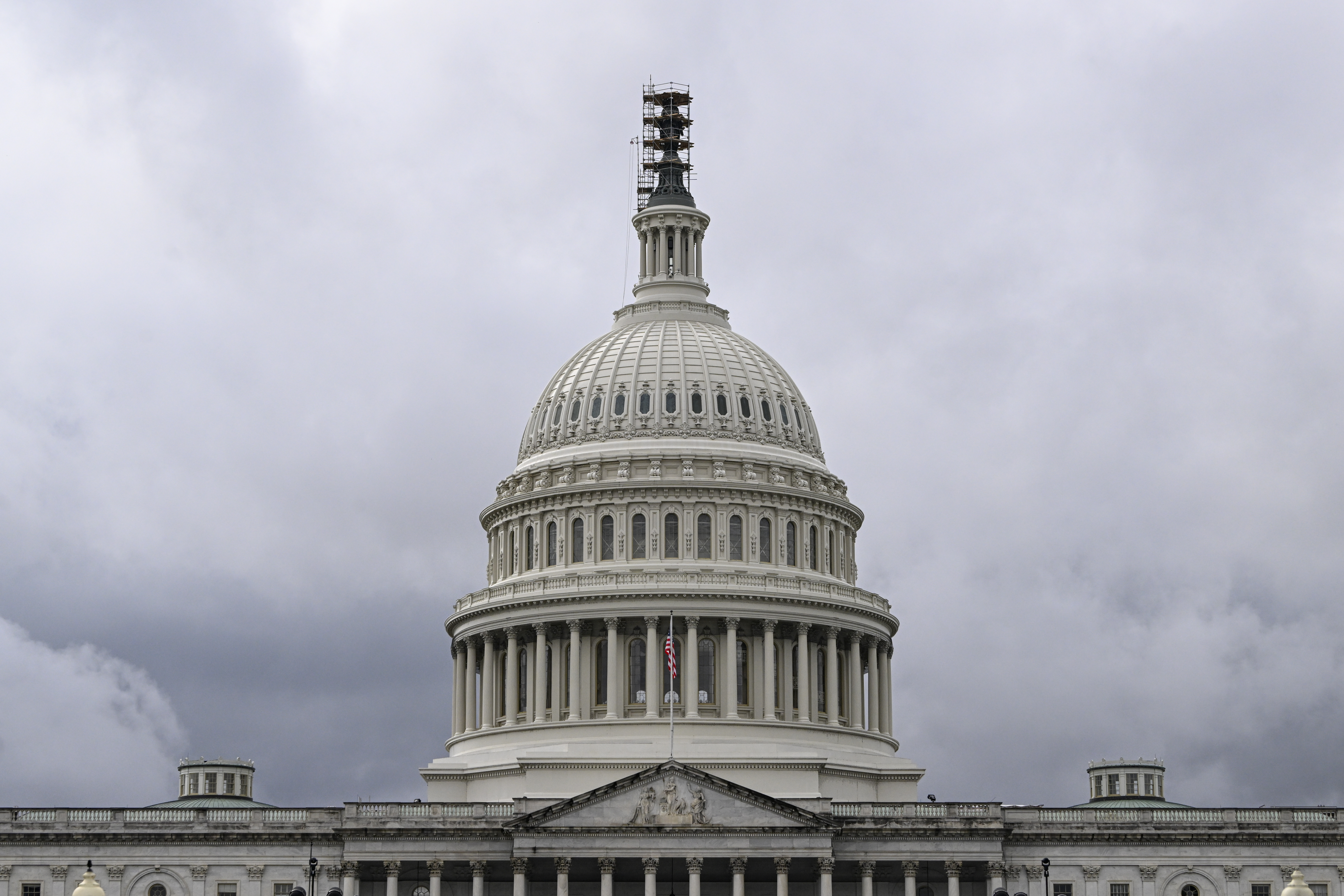
Celal Gunes/Anadolu Agency via Getty Images)
WASHINGTON D.C., UNITED STATES - SEPTEMBER 24: United States Capitol building is seen under construction in Washington D.C., United States on September 24, 2023.
The House Committee on Education and the Workforce is calling a hearing next week with the presidents of Harvard, the Massachusetts Institute of Technology and the University of Pennsylvania, where the university leaders will be asked to answer for antisemitic and violent incidents against Jewish students on their campuses, the committee announced on Tuesday.
“Over the past several weeks, we’ve seen countless examples of antisemitic demonstrations on college campuses. Meanwhile, college administrators have largely stood by, allowing horrific rhetoric to fester and grow,” committee Chair Virginia Foxx (R-NC) said in a statement.
“College and university presidents have a responsibility to foster and uphold a safe learning environment for their students and staff. Now is not a time for indecision or milquetoast statements. By holding this hearing, we are shining the spotlight on these campus leaders and demanding they take the appropriate action to stand strong against antisemitism.”
According to an announcement from the committee, the presidents will be asked to “answer for mishandling of antisemitic, violent protests.”
Harvard President Claudine Gay, UPenn President Liz Magill and MIT President Sally Kornbluth have all faced criticism for their responses to anti-Israel and antisemitic demonstrations and other incidents on their campuses.
Scores of schools across the country have taken similar flak for their responses to antisemitism on their campuses.
A committee spokesperson told Jewish Insider Foxx had chosen these schools because they had been “at the center of the rise in antisemitic protests.” The committee also contacted Columbia University which declined to attend due to a scheduling conflict. All three presidents are appearing voluntarily.
“President Gay has accepted the invitation to testify before the House Education and Workforce Committee on Dec. 5,” Harvard spokesperson Jason Newton told JI. “President Gay looks forward to sharing updates and information on the university’s work to support the Harvard community and combat antisemitism.”
MIT spokesperson Kimberly Allen told JI that Kornbluth “welcomes the opportunity to engage with the Committee Members” and referred JI to past statements on “recent events on campus.”
A UPenn spokesperson said in a statement, “President Magill understands the critical importance of fighting antisemitism and other forms of hate on Penn’s campus and looks forward to sharing the actions Penn is taking at next week’s hearing.”
Please log in if you already have a subscription, or subscribe to access the latest updates.





